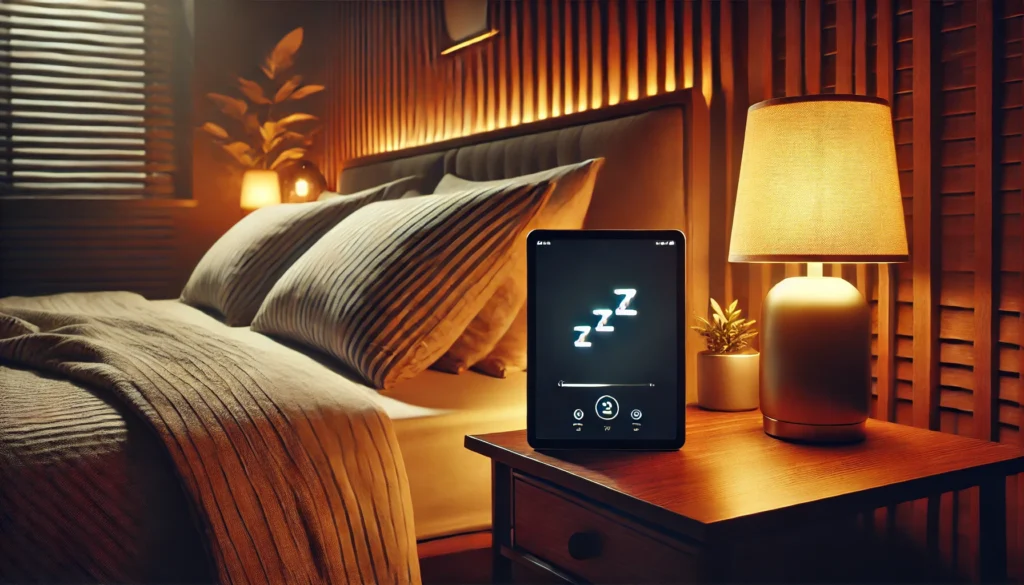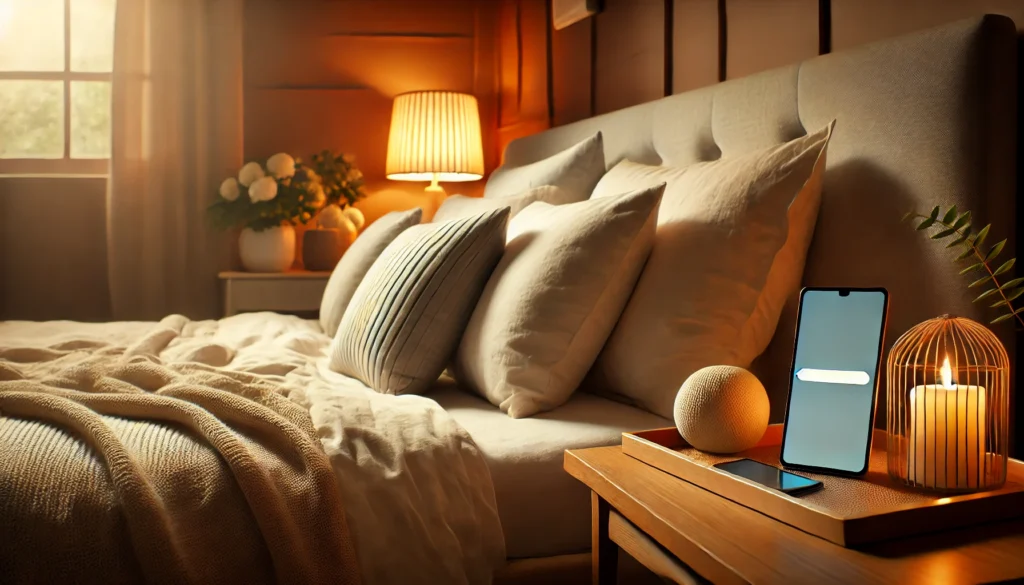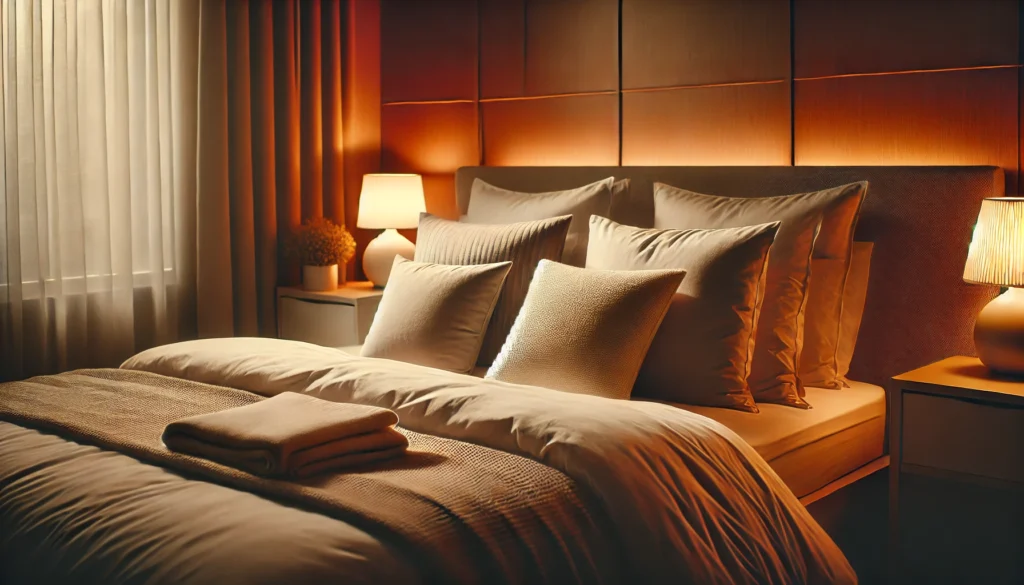In our fast-paced world, achieving a good night’s sleep can often seem elusive. The demands of modern life, coupled with constant connectivity, can make it difficult to unwind and drift into a peaceful slumber. Fortunately, technology offers innovative solutions to this age-old problem. This article delves into the realm of digital sleep aids, exploring how apps can transform our nightly slumber into an oasis of rest and rejuvenation. Whether you’re a chronic insomniac or just looking to enhance your sleep quality, there’s likely an app designed to meet your needs.
You May Also Like: Ultimate Guide to Sleep Tracker Apps
The Science of Sleep
Sleep is a complex biological process that plays a critical role in our overall health and well-being. It is during sleep that our bodies repair tissues, consolidate memories, and regulate various hormones. Moreover, sleep affects everything from our cognitive function and emotional regulation to our physical health. Understanding the science behind sleep can help us appreciate the value of using technology to enhance our nightly rest.
Historical Context
The quest for better sleep is not a modern phenomenon. Throughout history, humans have employed various methods to induce sleep, recognizing its importance to health and productivity. Ancient civilizations used herbal remedies like valerian root and chamomile, which are still popular today. In more recent times, practices like meditation and sound therapy have gained prominence as natural sleep aids. The advent of technology has brought about a new era in sleep improvement, where apps are designed to tackle insomnia and promote restful nights, integrating centuries of sleep knowledge with modern innovation.
The Physiology of Sleep
Understanding the physiology of sleep involves exploring the various stages of the sleep cycle, which include REM (rapid eye movement) and non-REM stages. Each stage plays a distinct role in restorative processes. For instance, deep sleep is crucial for physical recovery, while REM sleep is vital for cognitive functions such as learning and memory. Disruptions in these stages can lead to sleep disorders and health issues. Sleep apps often aim to optimize these stages by promoting natural sleep patterns and minimizing disruptions.
Sleep and its Impact on Health
The link between sleep and health is well-documented, with inadequate sleep being associated with a range of issues including obesity, diabetes, cardiovascular disease, and mental health disorders. Chronic sleep deprivation can impair immune function, increase stress levels, and reduce life expectancy. Sleep apps can play a role in improving health outcomes by helping users track sleep patterns, identify disturbances, and establish healthier sleep routines. By using technology to enhance sleep, individuals can potentially mitigate the health risks associated with poor sleep.
The Psychology of Sleep
Sleep is not only a physiological process but also a psychological one. Our mental state can greatly influence our ability to fall and stay asleep. Stress, anxiety, and depression are common psychological barriers to a good night’s sleep. Many sleep apps incorporate elements of cognitive behavioral therapy (CBT) to address these issues, offering tools to help users manage stress and reframe negative thought patterns that may be hindering sleep. By understanding the psychology of sleep, users can better utilize apps to create a conducive mental environment for rest.

Current Trends in Sleep Technology
In the digital age, the proliferation of sleep apps reflects a growing awareness of the importance of good sleep hygiene. As more people recognize the vital role sleep plays in health and productivity, there has been a surge in technology designed to improve sleep quality. These apps use a variety of techniques, including guided meditation, white noise, and cognitive behavioral therapy, to address sleep issues. The question remains: how effective are these tools, and what trends are shaping their development?
The Rise of Sleep Tracking
One of the most significant trends in sleep technology is the rise of sleep tracking. By using sensors and algorithms, sleep tracking apps monitor sleep duration and quality, offering insights into sleep patterns. This data can be invaluable for identifying issues such as sleep apnea or restless leg syndrome, which may require medical intervention. Users can also leverage this information to make informed decisions about lifestyle changes that may improve sleep, such as adjusting bedtime routines or reducing caffeine intake.
Personalized Sleep Solutions
Personalization is a key trend in sleep technology, with apps increasingly offering tailored solutions based on individual needs and preferences. By analyzing user data, these apps can provide customized recommendations, such as specific meditation techniques or soundscapes that are most effective for the user. This personalized approach enhances the relevance and effectiveness of sleep aids, making it more likely that users will stick with the app and see improvements in their sleep quality.
Integration with Wearable Devices
Another trend is the integration of sleep apps with wearable devices, such as smartwatches and fitness trackers. These devices can provide continuous, real-time data on various physiological parameters, such as heart rate and movement, offering a more comprehensive picture of sleep health. This integration enables more accurate sleep tracking and personalized feedback, empowering users to make more precise adjustments to their sleep habits.
The Influence of AI and Machine Learning
Artificial intelligence (AI) and machine learning are increasingly being incorporated into sleep technology, enabling more sophisticated analysis of sleep data. AI-driven apps can identify patterns and correlations that may not be immediately apparent, providing deeper insights into sleep behavior. These technologies can also adapt to changes in user behavior over time, offering dynamic recommendations that evolve with the user’s needs.
Exploring Apps to Help You Fall Asleep
With the rise of smartphone technology, sleep apps have become increasingly popular. These apps range from simple sound generators to sophisticated platforms that offer personalized sleep coaching. As the market for sleep aids grows, it’s essential to understand the different types of apps available and how they can address specific sleep challenges.
Insomnia Apps: A Closer Look
Insomnia is a prevalent sleep disorder that affects millions worldwide. It can lead to significant distress and impairment, making it a major focus of sleep app development. Fortunately, several apps have been developed to address this issue specifically. Apps like “Sleep Cycle” and “Calm” focus on tracking sleep patterns and providing insights into sleep quality, enabling users to make informed adjustments to their routines. These apps often incorporate elements of cognitive behavioral therapy (CBT) for insomnia, helping users modify behaviors and thoughts that contribute to sleep difficulties.
Sleep Cycle: Understanding Your Sleep Patterns
“Sleep Cycle” is a revolutionary app that analyzes users’ sleep patterns to help them wake up during the lightest phase of sleep. This method is believed to reduce grogginess and improve overall sleep quality. By using the phone’s accelerometer, the app tracks movements and offers detailed sleep analysis, allowing users to identify trends and make necessary changes. The app also provides insights into sleep cycles and offers features like a smart alarm clock that gently wakes users at the optimal time, promoting a more natural awakening process.
Calm: A Multifaceted Sleep Aid
“Calm” offers a multifaceted approach to sleep enhancement. With a library of sleep stories, guided meditations, and calming music, “Calm” provides a comprehensive toolkit for battling insomnia. The app’s meditative exercises are designed to relax the mind, preparing it for a peaceful transition into sleep. Additionally, “Calm” offers content for stress reduction and mindfulness, recognizing that mental well-being is closely linked to sleep quality. By addressing both the mind and body, “Calm” helps users create a holistic sleep environment.
The Role of Guided Meditation
Guided meditation is a popular feature in many sleep apps, offering a structured approach to relaxation and mindfulness. These meditations are often designed to reduce stress and anxiety, common barriers to sleep. By focusing on breathing techniques, visualization, and progressive muscle relaxation, guided meditations can help users release tension and prepare for sleep. Apps like “Headspace” and “Insight Timer” offer extensive libraries of guided meditations tailored for sleep, providing options for users with different preferences and needs.

Best Sleep Sound Apps
Sound plays a crucial role in sleep quality. Certain sounds can be soothing, while others may disturb our rest. This is where sleep sound apps come into play, offering a curated selection of audio designed to enhance sleep. From white noise to nature sounds, these apps help create an auditory environment conducive to restful sleep.
White Noise Apps: Creating a Sleep Sanctuary
White noise apps, such as “White Noise Lite” and “Noisli,” generate ambient sounds that mask disruptive noises in the environment. These apps provide a range of soundscapes, from the gentle hum of a fan to the rhythmic crash of ocean waves, helping users create an ideal sleep environment. By drowning out background noise, white noise can help individuals fall asleep faster and stay asleep longer, particularly in noisy environments.
White Noise Lite: Customizing Your Sleep Soundtrack
“White Noise Lite” offers an extensive array of sounds, including rain, wind, and nature sounds. Users can mix and match these sounds to create a personalized sleep soundtrack. The app also features a timer function, allowing users to set the sounds to fade out after a designated period. This customization feature empowers users to tailor their auditory experience to their preferences, promoting a more comfortable and restful sleep environment.
Noisli: Crafting Your Unique Soundscape
“Noisli” takes customization to the next level by allowing users to blend various sounds to create a unique auditory experience. The app’s interface is designed to enhance focus and relaxation, making it an excellent tool for not only sleep but also meditation and concentration. By providing users with the ability to adjust the volume and intensity of each sound, “Noisli” offers a highly personalized sound environment that can be adapted to different situations and needs.
The Benefits of Nature Sounds
Nature sounds, such as rain, ocean waves, and forest ambiance, are a popular choice for sleep sound apps due to their calming and grounding effects. Research suggests that these sounds can reduce stress and promote relaxation, making them ideal for sleep. Apps like “Rain Rain” and “Relax Melodies” offer extensive libraries of nature sounds, allowing users to immerse themselves in a natural soundscape that soothes the mind and body.
Future Implications of Sleep Technology
As technology continues to evolve, the future of sleep enhancement looks promising. With advancements in artificial intelligence and machine learning, sleep apps are becoming more sophisticated, offering personalized sleep solutions based on individual needs and preferences. These innovations hold the potential to revolutionize how we approach sleep health.
The Role of Artificial Intelligence
AI-driven apps like “SleepScore” use advanced algorithms to provide users with tailored recommendations for improving sleep quality. By analyzing data from sleep patterns, these apps can suggest changes in lifestyle, environment, or habits to foster better sleep. This level of personalization enhances the effectiveness of sleep aids, as recommendations are based on specific user data rather than generic advice.
The Integration of Wearable Technology
The integration of wearables with sleep apps represents a significant leap forward in sleep technology. Wearable devices like smartwatches and fitness trackers can monitor physiological signals such as heart rate and body temperature, providing deeper insights into sleep health. This integration allows for continuous monitoring and real-time feedback, enabling users to make timely adjustments to their sleep habits and environment.
The Potential of Virtual Reality
Virtual reality (VR) is an emerging trend in sleep technology, offering immersive experiences that can promote relaxation and enhance sleep. VR environments can simulate calming landscapes or guided meditation sessions, providing a novel way to unwind before bed. As VR technology becomes more accessible, it may become a valuable tool for individuals seeking innovative ways to improve sleep quality.
The Ethical Considerations of Sleep Technology
As sleep technology advances, ethical considerations must be addressed, particularly regarding data privacy and security. The collection and analysis of personal sleep data raise concerns about how this information is used and stored. Ensuring that sleep apps adhere to strict privacy standards is crucial to maintaining user trust and safeguarding sensitive information.

Practical Tips for Using Sleep Apps
While sleep apps offer immense potential, their effectiveness largely depends on how they are used. Here are some practical tips for maximizing the benefits of sleep technology:
Consistency is Key
Regular use of sleep apps can help establish a stable sleep routine, which is crucial for improving sleep quality. Consistency allows the body to align with natural sleep-wake cycles, promoting better rest. Set a regular bedtime and wake-up time, and use your sleep app consistently to track progress and identify patterns. Over time, this routine can lead to more restorative sleep and enhanced well-being.
Personalization Matters
Take advantage of the customization features offered by many apps to tailor the experience to your specific needs. Experiment with different soundscapes, meditation techniques, and sleep tracking settings to find what works best for you. Personalization enhances the relevance of the app, making it more likely that you’ll see positive results. Don’t be afraid to adjust settings as your needs change.
Complement with Good Sleep Hygiene
Use apps in conjunction with traditional sleep hygiene practices, such as maintaining a regular sleep schedule and creating a restful bedroom environment. Limit screen time before bed, keep your bedroom cool and dark, and avoid caffeine and heavy meals close to bedtime. By combining technology with tried-and-true sleep strategies, you can create a comprehensive approach to improving sleep quality.
Set Realistic Expectations
While sleep apps can be valuable tools, it’s important to set realistic expectations about their impact. They are not a cure-all for sleep disorders and may require time and patience to show results. Use apps as part of a broader sleep improvement strategy, and consult a healthcare professional if you have ongoing sleep concerns.
Conclusion
In conclusion, sleep apps offer a modern solution to an age-old problem. By harnessing the power of technology, these tools provide practical and effective strategies for achieving better sleep. Whether you struggle with insomnia or simply wish to enhance your sleep quality, these apps can be a valuable addition to your wellness toolkit. As sleep technology continues to advance, the potential for improved sleep health is vast and exciting.
As we continue to explore the intersection of technology and health, the potential for sleep improvement through digital tools remains vast and exciting. Embrace these innovations and sleep soundly knowing that restful nights are within reach. With the right combination of technology, knowledge, and healthy habits, better sleep is not just a dream—it’s a reality waiting to be achieved.
Further Reading:
Sleep Apps and the Benefits They Bring to Your Life
How the Best Sleep Tracker App Can Help You Get the Sleep You Need
Important Note: The information contained in this article is for general informational purposes only, and should not be construed as health or medical advice, nor is it intended to diagnose, prevent, treat, or cure any disease or health condition. Before embarking on any diet, fitness regimen, or program of nutritional supplementation, it is advisable to consult your healthcare professional in order to determine its safety and probable efficacy in terms of your individual state of health.
Regarding Nutritional Supplements Or Other Non-Prescription Health Products: If any nutritional supplements or other non-prescription health products are mentioned in the foregoing article, any claims or statements made about them have not been evaluated by the U.S. Food and Drug Administration, and such nutritional supplements or other health products are not intended to diagnose, treat, cure, or prevent any disease.


